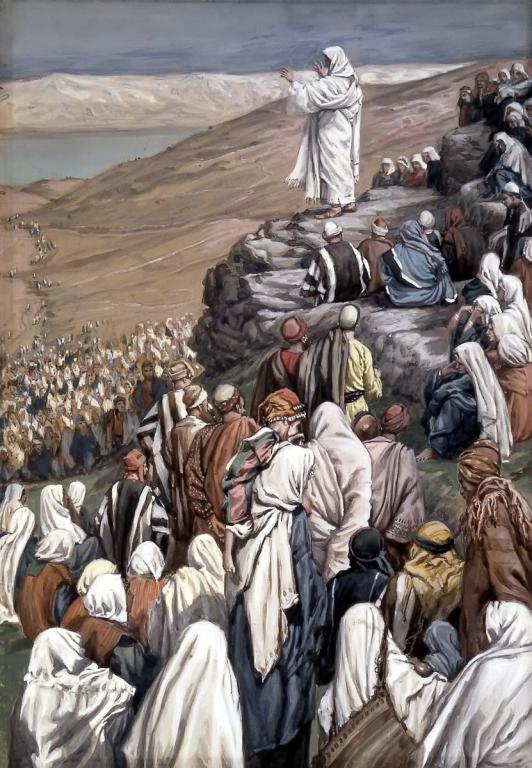
Wikimedia Commons public domain image
I’ve long had it in mind to do a brief book on the Beatitudes of the New Testament. I’ve made several starts on it, but — in a triumph of hope over experience — I think I’ll make a running leap at it once again, perhaps making it a special focus for the Sabbath. (Hawai’i very powerfully makes me think of “the Isles of the Blest.”) With that in mind, I share yet again some prefatory remarks on the topic, in very slightly modified form:
The so-called Beatitudes, as they are known to mainstream Christians, are principally found in the fifth chapter of the Gospel of Matthew, as part of the “Sermon on the Mount.” Each is a proverb-like proclamation, without narrative. Four of the blessings also appear in the “Sermon on the Plain” in the Gospel of Luke, followed by four woes that mirror the blessings.
In St. Jerome’s Latin Vulgate translation of the Bible, each Beatitude begins with the three-syllable plural adjective beati, which is rendered in the King James translation of the Bible (and in many, though not all, other translations) with the word blessed. The corresponding and synonymous word in the original Greek is μακάριοι (makarioi). The Latin noun beātitūdō apparently first appears in the writings of the Roman orator, politician, and philosopher Cicero, where it describes a state of blessedness.
I choose the New International Version (NIV) of the Bible for the sake of freshness:
3 “Blessed are the poor in spirit,
for theirs is the kingdom of heaven.
4 Blessed are those who mourn,
for they will be comforted.
5 Blessed are the meek,
for they will inherit the earth.
6 Blessed are those who hunger and thirst for righteousness,
for they will be filled.
7 Blessed are the merciful,
for they will be shown mercy.
8 Blessed are the pure in heart,
for they will see God.
9 Blessed are the peacemakers,
for they will be called children of God.
10 Blessed are those who are persecuted because of righteousness,
for theirs is the kingdom of heaven.
11 “Blessed are you when people insult you, persecute you and falsely say all kinds of evil against you because of me. 12 Rejoice and be glad, because great is your reward in heaven, for in the same way they persecuted the prophets who were before you.
As can be seen in the NIV’s formatting of the verses shown above, most careful readers of Matthew have numbered the Beatitudes as eight. Although 5:11 also begins with the word blessed, 5:11-12 can be easily read as simply expanding upon the beatitude given in 5:10. And that is how I read them.
The Beatitudes are also partially found in the so-called Sermon on the Plain that is located in the Gospel of Luke, at 6:20-26. The relationship at this point between the two texts, Matthew and Luke, has been much discussed, but that discussion is beyond my present purposes. Four of the Beatitudes are plainly present in the same “blessing form” as that in which Matthew gives them, but then those four are given again in what might be called an “anti-Beatitude” form, prefaced by the word woe:
20 Looking at his disciples, he said:
“Blessed are you who are poor,
for yours is the kingdom of God.
21 Blessed are you who hunger now,
for you will be satisfied.
Blessed are you who weep now,
for you will laugh.
22 Blessed are you when people hate you,
when they exclude you and insult you
and reject your name as evil,
because of the Son of Man.23 “Rejoice in that day and leap for joy, because great is your reward in heaven. For that is how their ancestors treated the prophets.
24 “But woe to you who are rich,
for you have already received your comfort.
25 Woe to you who are well fed now,
for you will go hungry.
Woe to you who laugh now,
for you will mourn and weep.
26 Woe to you when everyone speaks well of you,
for that is how their ancestors treated the false prophets.

In a series of forthcoming comments on the Beatitudes, I’ll be using Matthew as my primary source, but I’ll also be drawing from the Gospel of Luke and from a source peculiar to the Latter-day Saints: The risen Savior delivers a slightly modified version of the Sermon on the Mount to the Nephites — to distinguish it from the Sermon on the Mount and the Lukan Sermon on the Plain, Jack Welch calls it the “Sermon at the Temple” — that is recorded in the Book of Mormon at 3 Nephi 12-14. In that account, the Matthean Beatitudes occur, with some changes, at 3 Nephi 12:3-12.
More than once, critics of the Church of Jesus Christ of Latter-day Saints have demanded of me to know why we need the Book of Mormon or additional revelation, when we can’t even live up to what we already have in the Bible. But if our own inability to live up to the commandments in the Bible renders additional scripture superfluous, I am tempted to respond that the Beatitudes themselves contain so much, they impose so demanding a standard — a standard so far beyond our ability to live up to it — that all of the rest of the Bible itself, both the Old Testament or Hebrew Bible and the New Testament, must also seem redundant and unnecessary, even something of a cruel joke. In fact, since nobody has ever lived up to the injunction of Matthew 5:48 — “Be ye therefore perfect, even as your Father in Heaven is perfect” — one could argue on the same basis that every other verse of the entire Bible is superfluous.
But let’s return, briefly for now, to the word blessed:
The Greek makar or makarios meant “blessed” or “happy,” and was properly used to refer to the gods. They were the makares, or “blessed ones.” With respect to men, the word meant “supremely blest,” “fortunate,” but also “prosperous,” and “wealthy.” For humans, it was especially the dead who were called “blessed ones,” since they were beyond the reach of pain and death. They dwelt in the abode of the blessed, makaria. The makaron nesoi or “islands of the blest” were, interestingly enough, placed by the later Greeks in the ocean at the extreme West of the world. [See Liddel and Scott, s.v. makar, makaria, and makarios.]
Posted from Waikōloa, Hawai’i Island, Hawai’i











